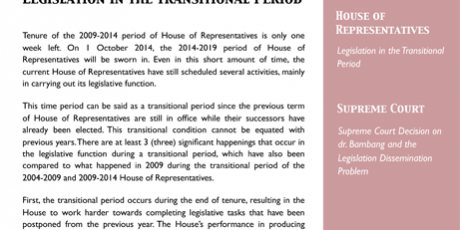House of Representatives
Legislation in the Transitional Period
Tenure of the 2009-2014 period of House of Representatives is only one week left. On 1 October 2014, the 2014-2019 period of House of Representatives will be sworn in. Even in this short amount of time, the current House of Representatives have still scheduled several activities, mainly in carrying out its legislative function.
This time period can be said as a transitional period since the previous term of House of Representatives are still in office while their successors have already been elected. This transitional condition cannot be equated with previous years. There are at least 3(three) significant happenings that occur in the legislative function during a transitional period, which have also been compared to what happened in 2009 during the transitional period of the 2004-2009 and 2009-2014 House of Representatives.
First, the transitional period occurs during the end of tenure, resulting in the House to work harder towards completing legislative tasks that have been postponed from the previous year. The House’s performance in producing laws in the transitional period tends to escalate compared to the previous three years. In 2009, the Housesuccessfully ratified 32 Bills into Laws, whereas in 2008 they only produced 13 Laws (a number which does not include Laws in the National Budget, ratification of international treaties, and regional growth). This condition occurred due to cost and time efficiency. (FN)
Supreme Court
Supreme Court Decision on dr. Bambang and the Legislation Dissemination Problem
The Supreme Court sentenced one and a half years of jail time to a convicted a surgeon who did not have a license to practice. The Constitutional Court has removed the imprisonment sentence for the practice of medicine license violation as stipulated under Law No. 29 Year 2004 on the Practice of Medicine.
The case involves Bambang Suprapto, a surgeon who was reported to the police by a member of the patient’s family. The patient had received tumor surgery in 2007 and later died in 2008. Bambang Suprapto was prosecuted on charges of malpractice and the practice of medicine license violation as a surgeon at the hospital where the patient underwent the operation. In the first instance, Bambang Suprapto wasacquitted although he was found guilty for violating the provision of the license. In the 2011 decision, the District Court of Madiun City did not consider the violation as a criminal offense. However, in October 2013, the Supreme Court sentenced Bambang Suprapto to jail and the decision could be obtained by the defendant in September 2014. The panel of judges, chaired by Justice Artidjo Alkostar, used Article 76 of the Law on the Practice of Medicine to impose a prison sentence on the defendant. In fact, in 2007, the Constitutional Court has removed the imprisonment clause from this article although keeping the penalty of fines in force.
Application of the provisions that have been annulled by the Constitutional Court has happened in several cases. In 2008, for instance, the Indonesian Legal Resource Centre (ILRC) found that law enforcement agencies, especially the police, often use Article 31 of the Advocate Law to prohibit campus-based legal aid officers who wantto assist their clients when dealing with police in a criminal investigation process. Article 31 prohibits persons who are not lawyers to run advocacy professions, include providing legal aid. The Article itself has been declared unconstitutional by a Constitutional Court decision in 2004.
These two cases indicate that there is lack of communication between the Constitutional Court and other state institutions. As a result, not all state authorities, particularly law enforcement agencies, know of the decisions handed down by the Court. Unlike the Supreme Court decision, the Constitutional Court decision does not require execution, but must be implemented immediately. In practice, the executive power—which is the government—has a role in promulgating and disseminating laws, including laws of which the material has been changed under the Constitutional Court decision. Technically, any laws with changes should be updated and be disseminated under the authority of the Ministry of Law and Human Rights. (GAT)

